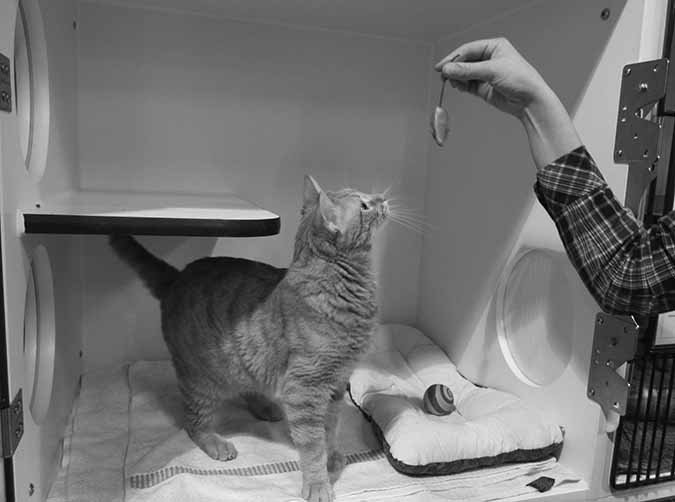Cats crave routine and seem to be in sync with your work schedule. But they know that the daily routine is about to be upended when they see you bring out the dreaded suitcase. Even though you look forward to a much-needed vacation, you may find yourself worrying about how your cat will fare during your absence.
After friends and relatives, your options for care are boarding or hiring a professional pet sitter. The choice depends on your cat’s health, temperament and experience with other companion animals. To set him up for success while you’re away, it’s also important to base your decision on his safety and well-being.
Staying at Home
“Cats who are easily stressed by change in routine or environment or by unfamiliar cats are better suited to staying in their own home,” says Leni Kaplan, MS, DVM, a lecturer in the Community Practice Service at Cornell University College of Veterinary Medicine. “Cats who are not used to living with dogs will be quite stressed in a boarding facility with barking dogs, an experience that may be new to them.” A cat-only facility might be the wiser choice.
Keep in mind that all cats need and deserve time alone for sleeping, eating and relaxing. It’s imperative that those caring for your cat understand feline behavior, recognize signs of stress and can administer medication if needed. “They also need to recognize early signs that your pet needs to be examined by a veterinarian,” Dr. Kaplan says.
Stick to Diet
She suggests owners take a favorite cat bed from home, toys and a piece of their own worn clothing with their scent to comfort their cats. They will also do better eating their regular food from their own bowl, and if the facility can provide Feliway — a feline pheromone — make sure staffers spray the cat’s bed and blanket twice daily to help combat stress.
In choosing a professional pet sitter, consider one who belongs to a professional pet sitting organization, such as the National Association of Professional Pet Sitters, www.petsitters.org, and Pet Sitters International, www.petsit.com. Individuals must show proof of being licensed and bonded.
Take the time to set up a meet-and-greet between a pet sitter and your cat at home to gauge compatibility. “Engaging a pet sitter who is already familiar with your cat is also great, as this may decrease your cat’s anxiety when you are out of town,” Dr. Kaplan says. “Find one who expresses an interest in what your cat likes and who strives to maintain your cat’s schedule.”
Maintain Routine
Yvette Gonzalez, president of the Pet Sitters Association and owner of the As You Wish Pet Sitters in Denver, says: “Our philosophy is that the companion animal is healthier and happier in his own surroundings and when maintaining his own schedule. Deviation from routines, particularly in cats, can throw off their health and psyche.”
Both NAPPS and Pet Sitters International offer membership lists for the public that identify members’ credentials, services and geographic areas they cover. They also provide on-going education for members through webinars, conferences and publications.
If your cat enjoys other pets, is even-tempered and not easily rattled by change, consider sending him to a boarding facility. The International Boarding and Pet Services Association, www.ibpsa.com, offers training and encourages members to cultivate strong relationships with local veterinarians, says Director Carmen Rustenbeck. She recommends choosing a facility with a trained staff who welcomes questions.
“A quality boarding facility staff will make you and your pet feel welcomed when you walk in, will be willing to answer your questions, conduct a tour,” Rustenbeck says. “We also recommend having someone on site at night.”
Do an Inspection
If you choose to board your cat, visit the premises beforehand to assess cleanliness and odor. Ask how often cats are exercised and allowed out of their rooms, if any disease outbreaks have occurred and procedures for handling a situation when an animal needs veterinary attention.
Facilities should require a copy of a pet’s vaccine certificate. All cats should be up to date on vaccines for rabies, feline panleukopenia, feline herpesvirus and feline calicivirus, Dr. Kaplan says, adding that, with combination vaccines, cats receive one injection providing protection against the three latter viruses. “These viruses are highly contagious and can cause a serious outbreak in a boarding facility.”
If a cat is not up to date on these vaccines for medical reasons, the owner should provide a letter from the cat’s veterinarian explaining why he is exempt from vaccination.




